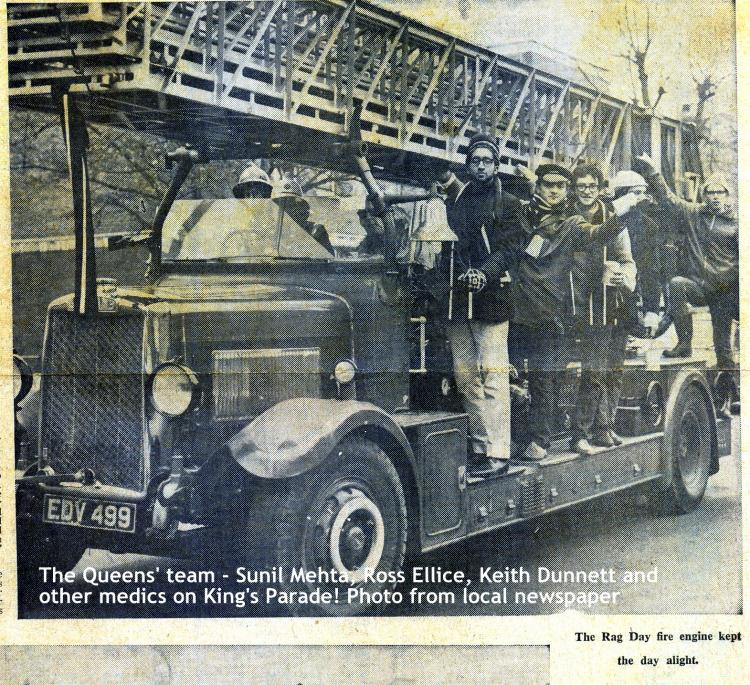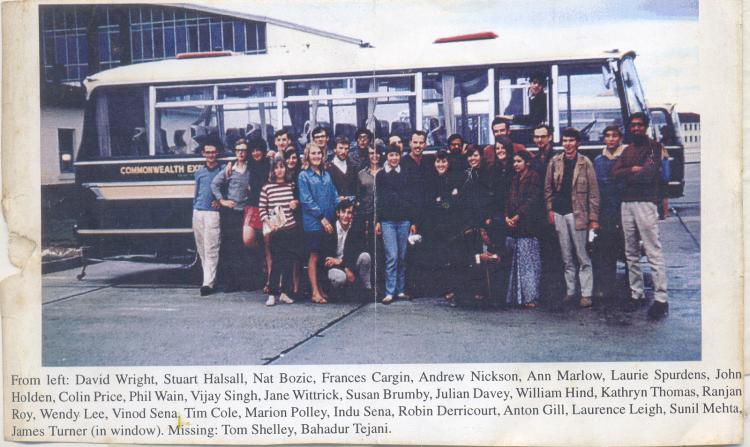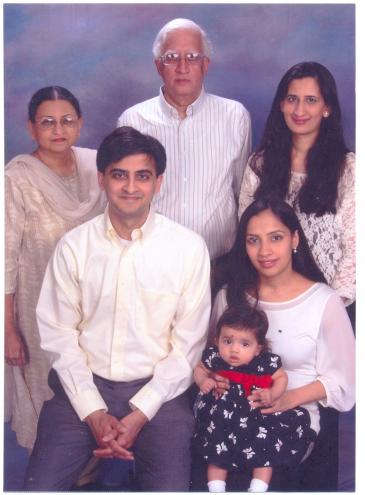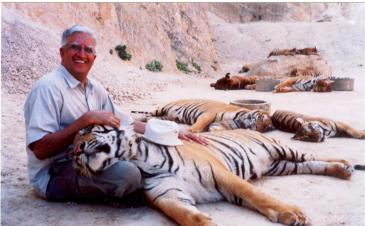Now travel writer and artist, Sunil S Mehta (1966) recalls his time at Queens' and the path laid out to get there.
First trip to Queens'
At age 9, I was taken from Bombay to see my school and college in England – Dulwich College and Queens’ College, Cambridge - where I had a brother studying at each place. At that age, coming from a rather strict background – be seen but not heard and happily living in a joint family of 22 members – it was a revelation. In Cambridge, we strolled along the Backs and King’s College before having tea with the President Dr J A Venn. His study faced the Mathematical Bridge. After the usual courtesies to my parents, Dr Wenn asked me: “Young man, which college would you like to attend?” In all innocence, (don’t forget I was only 9 years old), and having just experienced the majesty of King’s with its far larger manicured lawns, its magnificent chapel and courts of residence, I replied: “King’s College, Sir”. My parents were really embarrassed. The elderly Dr Venn took me gently by the arm all the way to the window, from which we could see the Backs, and said softly, “ Young man, King’s lies that a way!” Those words have never ever been forgotten by me, as my parents regaled everybody for decades with this story.
Family History
Queens’ is part of our family history. We are the only family in Bombay, possibly India, where three brothers have attended the same college and our father was from Fitzwilliam – total four people same university. My eldest brother, Anil, studied Natural Sciences under Lord Todd and my brother Ramesh read Economics. My cousin was current President John Eatwell’s tutorial partner. At Dulwich, I had a tough time adjusting to the educational style but enjoyed the extracurricular activities and sports. Suffice it to say that the formidable Dr Maxwell Bull had faith in me and agreed to accept me. I was keen to read Sociology but Cambridge did not have it as an under grad course so I opted for Archaeology & Anthropology – Oxford was not an option as we had a total of eight male family members from Cambridge who had been at Peterhouse, Fitzwilliam, Queens’ etc. So the pressure to be a Queensman was enormous – though then never understood by me – I think my parents felt it most. It was a fascinating three years made more remarkable for the fact that in Part 1, second paper Archaeology, I had a total mental blackout and could not write a single word. In sheer terror, I met my supervisor G I Jones who discussed the case with Prof Cole, a brilliant American archaeologist and our principal Arch Prof and they passed me eventually based on overall annual performance. It was a unique privilege to study under Prof Cole, Prof Meyer Fortes, Prof Bushnell and Prof Tambiah – living legends as they had undertaken seminal works which we were studying for our degrees. In my 2nd year, the Prince of Wales joined as an undergrad in our faculty.
Memories

I had stayed at Madingley Hall with my brother, before joining Queens’ as I prepared for my A level exams, so I knew Cambridge better than the new undergrads; Prof Dr Bushnell, as ancient as they come, teaching us about Bushmen amongst all those wonderful artifacts in the Anth Museum; the UL (University Library) where I was exposed to a wealth of knowledge in that grey forbidding building, my first punting on the river whilst losing the pole; buying expensive grey Scandinavian wine glasses and a fancy tea set from a shop next to Copper Kettle – I have them even today; Dr Andy Tanner climbing over the Fisher Court gate and leaving his arm embedded in the spikes – singing Hey Jude at the Addenbrooke’s whilst getting stitched up – he didn’t need any anesthetic as he had enough alcohol in him; formal dinners each evening in Hall with the two grim butlers whom we impolitely named Tweedledum and Tweedledee; playing croquet regularly with the Pakistanis from Selwyn – as darkness approached we’d place a lit candle on the croquet hoop to be able to see it clearly; the gowned Dr Bull walking to his study – one crossed the path to avoid his beady stare; the beautiful Walnut Tree court which has today lost its tree; my first experience of imbibing far too much at the pub across the bridge. Many an hour was spent learning drinking rather than anthropology. The final memory is of the bitterly cold winter winds which came across the Ural mountains and seeped into your bones despite the warm clothing.
Commonwealth Overland Expedition #2 to India
In term time 1967, I was walking along Trinity Lane and somewhere opposite John’s, I saw a board inviting students to sign up for the Commonwealth Overland Expedition # 2 (Comex) – from London to India and back in the summer holidays. I walked in and was invited to the group meeting. I don’t recall the details of how I was chosen but I had the privilege of being on Comex 2 – four weeks out to Delhi and three weeks back, with two weeks in India. The Comex strategy of Jawaharlal Nehru and Col. Lionel Gregory was to create an adventurous journey by land, sea or air with appropriate entertainment the means of meeting large numbers of people. En route, each coach group enacted plays, dances or sang to varied audiences in major cities. Comex 2 had contingents from twelve universities – equal representation of town and gown. Their story is told in Crying Drums with a foreword by Prince Philip.
Here are a few personal nuggets...
- The total cost payable by me was Sterling 100 – yes, Pounds 100. A considerable sum in those days when a year’s College fee was around Pds 700. This was for a 9 weeks trip inclusive of all meals, travel etc. It cost me another St Pds 50 for personal expenses. We slept under a huge tent which stretched from one side of the coach to the other - lengthwise.
- I was designated radio operator, which during my shift, allowed me to sit right behind the driver and gave me a fabulous view of the scenery all around. We were #3 coach in line out of the 12 coaches travelling to Skopje. I was on duty mid afternoon when we came across the debris of tourist shopping and personal effects and then saw the overturned Durham coach, opened partly like a sardine can, with the dead bodies of our 14 fellow travellers lying around. Luckily most of my group were asleep. We immediately proceeded to Skopje, and then came all the inquiries and trauma handling. A really sad ending to a successful tour. For years, I never travelled by coach again until recently.
- At Mt Ararat, due to bandits in the vicinity, we had tight security all night. In Turkey, crossing the high mountains, our coaches were welcomed by kids throwing stones – we had to replace six windscreens at Tehran on the way out. On the return, we had no replacements so we kept our heads below seat level wearing our sleeping bags to keep out the bitter late September European cold winds roaring straight into the front of the coaches.
- Imagine over 500 miles of corrugated desert roads between Iran and Afghanistan – you drove either at 70mph or 10mph. One had no option but go at speed to avoid delays. Despite ensuring that there were no windows open, and the coach’s dickey / boot was firmly closed, every night, there was a thick layer of sand all over and inside, which had to be removed daily.
- Arriving into Afghanistan, the road from Herat to Kandahar was tarred and then onto Kabul it was concrete. An embankment of a height of over ten feet was built for the road to avoid sudden floods on the desert floor. At one point, driving late evening, we found the road had disappeared! Instead there was a diversion and we carried on. Due to the Iran border being impossibly bureaucratic (they asked the names of great grandparents and other details which most of made up) it took over 24 hours for the last coach to get through the border. It was way behind without radio contact. The driver never saw the road break but he kept incredible presence of mind and locked the brakes – driving at 70 mph, he sailed over the break and did an amazing pancake landing – the only casualty was the First Aid box which sailed through the aisle and landed on the dashboard after breaking someone’s small finger! The coach arrived under its own steam many hours later at Kabul where we all were waiting.
- Returning from Comex, i got a duodenal ulcer due to the rough diet and hard trip. So, i was sent to the Sick Bay for over 2 months and spent Michaelmas term there. My diet was boiled/ grilled fish or chicken and veg. For each meal. Dessert was only Jelly. Two pints of milk daily. I was used to buffalo milk which is creamier than cow's milk. So hearing this, my fellow sick person, a rugger player, told Matron with a straight face, that this gentleman needed buffalo's milk and she must get a buffalo from the Vet School which could be tied up outside Fisher Court's green where the sickbay was located. Matron was too stunned and went to Dr Machin with the story. He saw through it and told her that someone had played a fast one on her. We had a good laugh when she returned and told us his reaction.

I plan on writing an article on Comex in my travel blog at http://multitaskerme.blogspot.in/ after this summer. Many of my other travels and photos are in this blog.
Second year
Another unexpected experience was my selection of my roommate for the second year – Stephen Crosse. It turned out that both his brothers were Queensmen too, at the same time as my brothers (1953-56 and 1956-59), they knew each other and Steve and I today are close friends despite the inquisition I subjected him to when selecting him as a roommate. My years at T10 and G1 are totally unforgettable …… friends made for a lifetime.
The inimitable Jack Harper, with whom I spent three crazy days in Dublin last year, introduced me to Quarr Abbey, a Benedictine monastery on the Isle of Wight. An oasis of calm and serenity where I went to study before Part 1 exams. I desperately needed my sanity as the stress of exams and a departing lady friend were getting to me. Over the years and many visits, I have loved the order and the Order, though the monks (many were Oxbridge graduates) have declined in numbers from 40 in 1967 to just 7 a few years ago. Sitting in total darkness for Compline service at 9 pm in the Chapel, with just a small blue light near the Cross, the monks entering in pairs to their appointed places, singing their solemn Gregorian chant, was unforgettable and awesome. It was as if one was having a personal communion with Him. Time passed, over many visits, the service changed as monks declined but still Quarr remains in my heart as one of two places where one can commune directly with Him and the Abbey’s serenity and the inner beauty will always remain.
Looking back...
Due to Queens' and my Arch and Anth course which taught me a lot about human nature, different world societies and social values, when I began working in Marketing and Advertising in 1972 I had a greater understanding of human nature than  many colleagues. My forced part time experience as a plongeur and postman during winter vacations (when funds were rather short), I learnt to appreciate and understand other less fortunate people. In India, I would never ever have dreamt of doing such work. For me, it was an important lesson as in my country we look down upon menial jobs and I learnt there should be no hesitation in leading from the front by setting an example... a principle I have religiously followed. It was the mix of different life styles at College – from our Alexandrian’s Dining Club to these jobs - which brought home to me the importance of understanding and assimilating with people of all backgrounds.
many colleagues. My forced part time experience as a plongeur and postman during winter vacations (when funds were rather short), I learnt to appreciate and understand other less fortunate people. In India, I would never ever have dreamt of doing such work. For me, it was an important lesson as in my country we look down upon menial jobs and I learnt there should be no hesitation in leading from the front by setting an example... a principle I have religiously followed. It was the mix of different life styles at College – from our Alexandrian’s Dining Club to these jobs - which brought home to me the importance of understanding and assimilating with people of all backgrounds.
As my tutor, I had the soft spoken Dr Kenneth Machin – a wonderful human being. In my last term, as I had never learnt economics and no one had taught me how to budget my funds, I ran out of money to pay the final college bill. The Govt of India at the time had severe fiscal restrictions on remittances and frantic correspondence and calls were made – and seeing our family history, the College allowed me to graduate even though the bill was paid after due date!
I can never forget my debt to Dr Machin and his wife for their consistent emotional support and understanding of student issues; and to Queens’ for its overall involvement into creating me into what I am today. I echo Julian Rimmer who has expressed his thoughts beautifully “I look back with a strange mixture of happiness, regret, intense nostalgia” as there were many more things I could have achieved during my time. There is no doubt that my Queens’ experience gave me the confidence to embark on a career path which has seen my many avatars (currently as artist and travel writer) but throughout, unwaveringly, I ensured that my work was fulfilling, successful and made my family and me happy.
- Sunil S Mehta, Mumbai
Sunil is an avid travel blogger & artist. His travels writing can be found: http://multitaskerme.blogspot.in/ and paintings in different mediums can be viewed here: http://www.art4allindia.com/.
Contact me on: sunilsmehta@gmail.com
